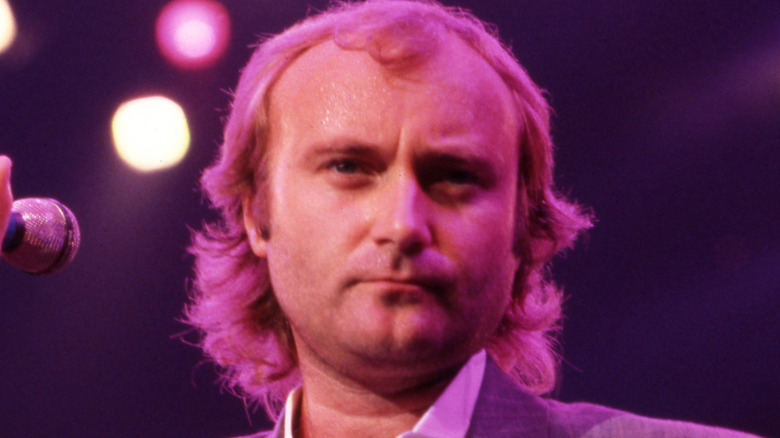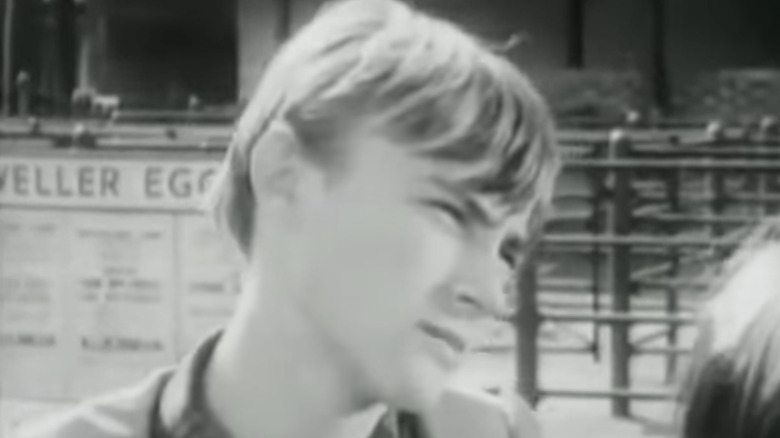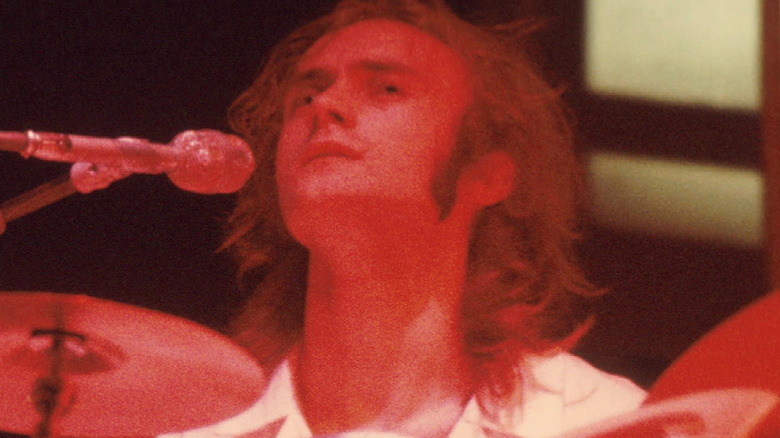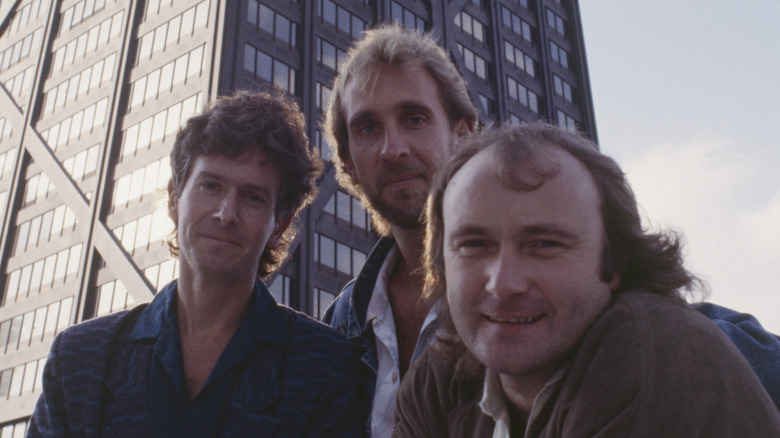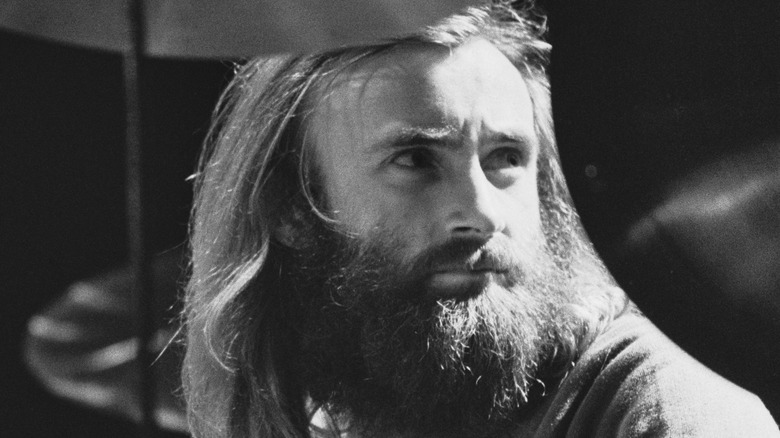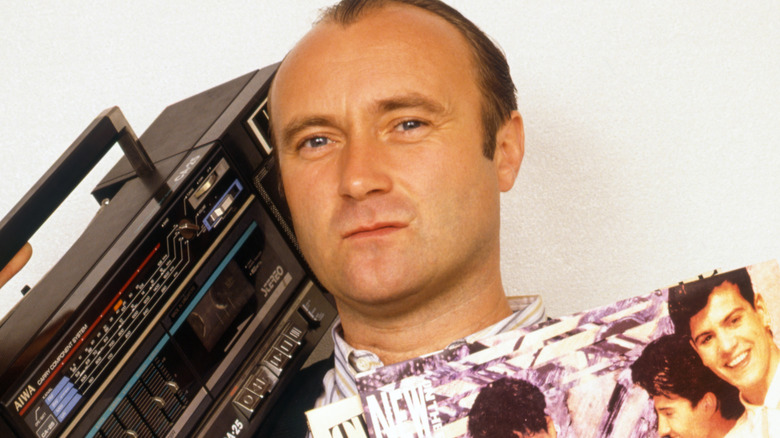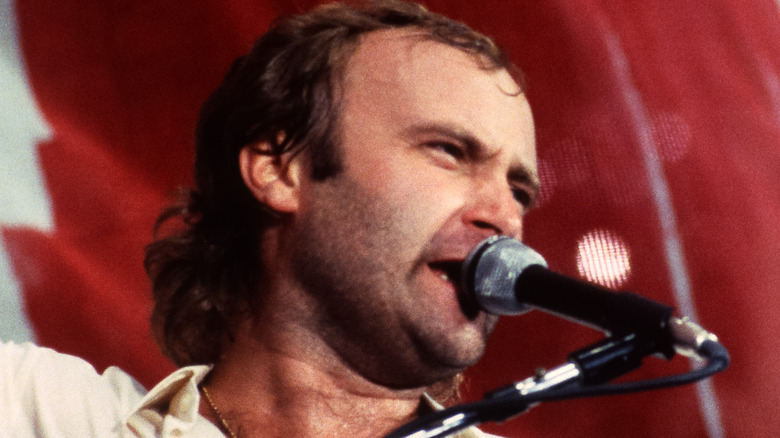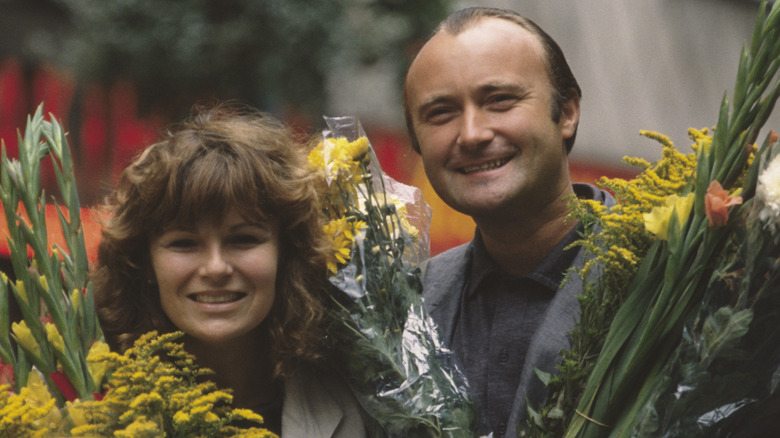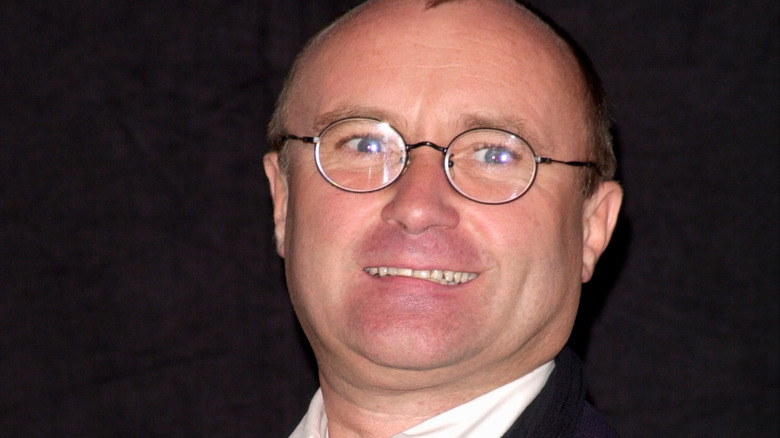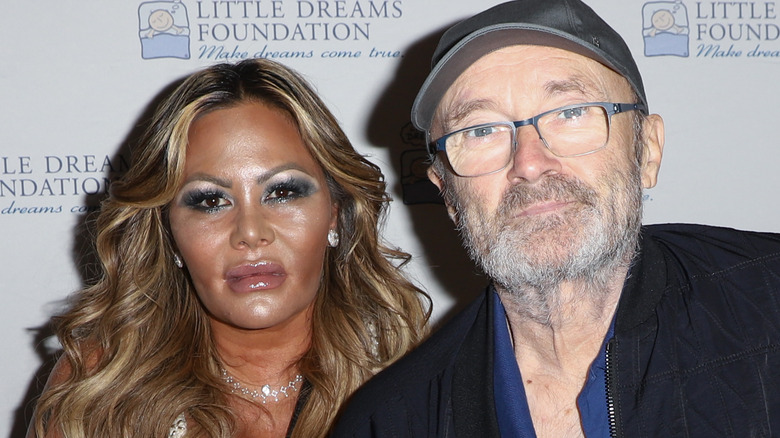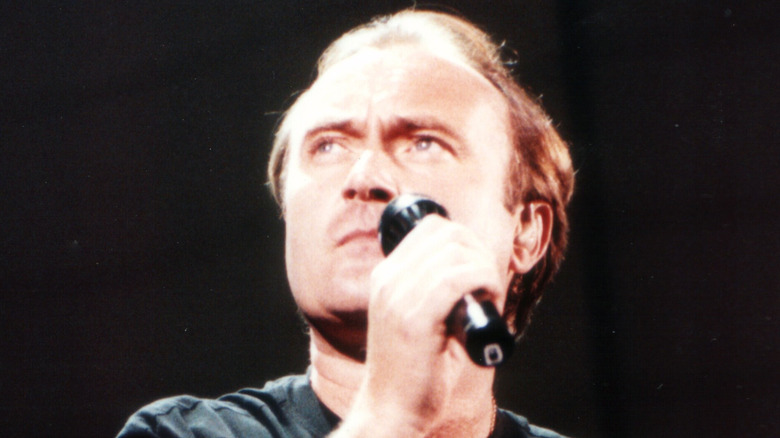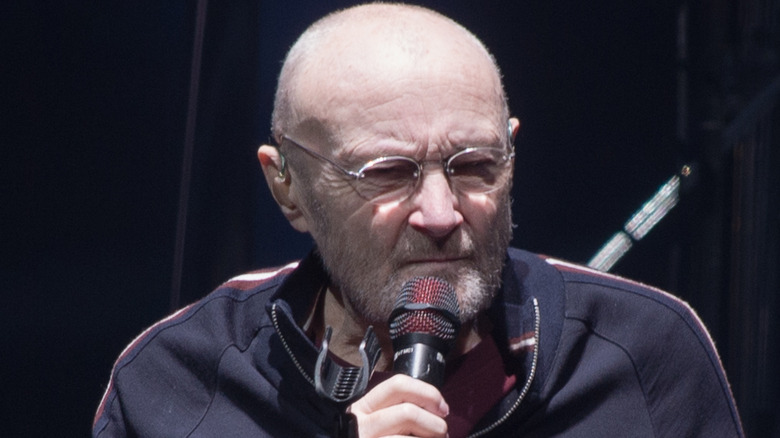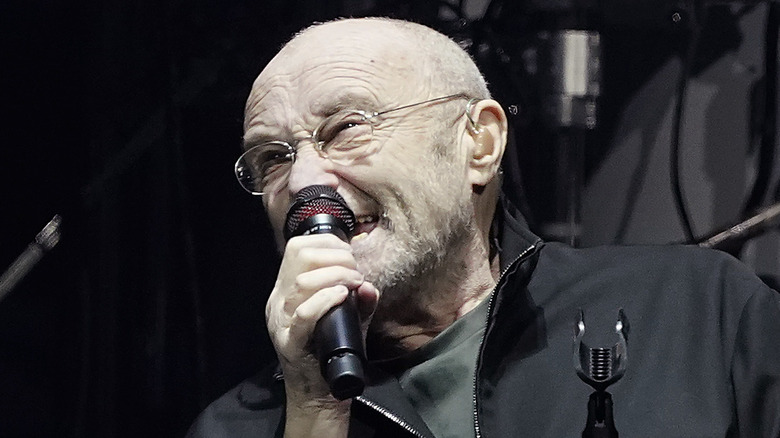The Untold Truth Of Phil Collins
Who are the most dominant pop music icons of the 1980s? They were the flashiest, most provocative, R&B-incorporating musicians that come to mind when thinking of the era: Michael Jackson, Prince, Madonna, and George Michael. But then there's Phil Collins, an unlikely superstar. Long before he started churning out hit after hit in the '80s, ballads like "One More Night," "A Groovy Kind of Love," and "Against All Odds (Take a Look at Me Now)," and crowd-pleasing, gently rocking bangers like "In the Air Tonight," "Easy Lover," and "Sussudio," Collins was the frenetic, technically precise drummer on the complicated progressive rock stylings of the artsy '70s rock band Genesis.
A public figure for over 50 years as a drummer, singer, actor, and tabloid-friendly celebrity presence, Phil Collins has lived a long, complicated and interesting existence, personally and professionally. He's made a lot of music, and a lot of varied music at that, even winning an Academy Award for his ballad from the Disney classic "Tarzan." Here's the moment for which you've been waiting all your life — a deep dive into the life of Phil Collins.
Phil Collins was a child actor
Long before he entertained any notions of being a rock n' roll performer, drumming, singing, or otherwise, a young Phil Collins pursued the creative life as an actor. According to the Express, it was relatively easy for Collins to jump into professional acting because his mother ran a theatrical agency for a London performing arts school. In 1964, she received a call from the producers of "Oliver!," the West End-based hit musical version of Charles Dickens' "Oliver Twist." They needed a new actor to play the mischievous street urchin known as the Artful Dodger, so she sent her son on an audition. Collins, 13 at the time, beat out around 100 other actors for the part. He held the role for seven months, quitting after his puberty struck and his voice "began croaking on some of the lower notes" during a performance.
Nevertheless, teenage Collins made the jump from stage to screen. He was cast as an audience member in a concert scene in the 1964 Beatles movie "A Hard Day's Night," according to Cosmic Magazine, but didn't show up in the final cut. Collins similarly played an extra in "Chitty Chitty Bang Bang" but was also edited out because of an unsightly bandage on his head, "Because I had this big cyst on the side," Collins told The Independent. Collins successfully stayed in the 1967 family comedy "Calamity the Cow," playing a farm kid who raises a show cow.
Phil Collins lucked his way into Genesis
Phil Collins' first taste of rock fame and success came as the drummer for the '70s progressive rock band (turned '80s soft rock band) Genesis. He wasn't an original member of the group, but the band's fourth drummer, following Chris Stewart, John Silver, and John Mayhew, according to AllMusic. In 1970, Genesis held auditions to replace Mayhew, and Collins, a veteran of bands like Flaming Youth, secured a tryout, despite not really knowing what he was getting into. "I'd never heard the band Genesis, I'd heard of them," Collins told "Ultimate Classic Rock Nights" (via UCR).
At the very least, the audition would be a pleasant experience — the band saw drummers on the patio of the farmhouse owned by singer Peter Gabriel's parents. Collins arrived hours early, and Gabriel graciously suggested that the drummer go for a swim in the pool while the other musicians auditioned. Not far from the spot where the musical happenings were taking place, swimming gave Collins an advantage — would-be Genesis drummers were asked to play a previously unheard, unrehearsed audition piece on the spot. "So I went and had a swim. I could hear anything that was going down. I knew the tunes before I actually auditioned," Collins explained. "So when I came up to play, of course I walked straight into it. I knew all the things, so I got the job!"
Phil Collins became the lead singer of Genesis because nobody else could do it
Peter Gabriel wasn't just the lead singer for the early incarnation of Genesis, he was a commanding stage presence, wearing bizarre and elaborate costumes and belting out vocals with one of the most soulful and recognizable voices in rock history. When he left the group in 1975, according to UCR, it represented a monumental shift in Genesis. "For a time, I thought we'd carry on as a four-piece without any singing," drummer Phil Collins told Prog. Deciding against that, the band put out a call for singers to submit their audition tapes, and such notables as Mick Rogers of Manfred Mann and Nick Lowe threw their proverbial hats in the ring.
The remaining members of Genesis didn't feel that any newcomer really gelled, until they realized they had a pretty good singer in the mix already: Collins, who'd occasionally taken the vocals on a deep album cut here and there. "It was the last thing I wanted to do," Collins told iNews. "But when Peter left we couldn't find another singer and so the rest of the band convinced me to do it."
The Who wanted Phil Collins?
The top echelon of British rock in the 1970s was a small, tight-knit brotherhood, populated by just a handful of bands, such as Phil Collins' Genesis and The Who. Collins was friendly with the latter act, taking on the role of Uncle Ernie in the star-studded theatrical adaptation of The Who's trippy concept album "Tommy," after working with guitarist and songwriter Pete Townshend on some other projects in the late 1970s.
In September 1978, according to Rolling Stone, The Who's drummer Keith Moon died from circumstances resulting from his alcoholism. In the wake of that tragedy, Townshend and Collins collaborated in the studio, and the latter offered up his services to the band. "I said to him: 'Have you got anybody to play the drums? Cos I'd love to do it,'" Collins recalled to Classic Rock. He even offered to bail on Genesis in favor of the higher-profile gig with The Who. Townshend then sadly broke the news to Collins that he'd already hired frequent Who collaborator Kenney Jones to replace Moon. "But I would have done the job. I would have joined them," Collins said.
Phil Collins had three careers in the '80s
Phil Collins so often topped the Billboard Hot 100 pop chart, or nearly did so, at such a rate in the 1980s and early 1990s that it was almost routine. Between 1980 and 1994, 18 of Collins' singles reached the Top 40, and six of them hit #1. Even more impressively, during the same span of time, Collins concurrently served as the lead singer of Genesis, where the group was almost as successful on the pop chart, with 16 Top 40 hits and a chart-topper in 1986 with "Invisible Touch." Unlike other singers of the late 20th century who found massive popularity fronting a band which they then departed for solo success — like Peter Cetera of Chicago, Bobby Brown of New Edition, Annie Lennox of Eurythmics, or Peter Gabriel of Genesis — Collins didn't leave his group, choosing to moonlight and juggle his soft rock solo stuff with the more rock-oriented Genesis. Collins wouldn't actually leave the group until 1996, well after the band's commercial peak.
And Collins still found the time to play drums and percussion on other artists' recordings. He performed on numerous releases by the jazz-fusion collective Brand X, played drums on Daryl Hall's solo LP "Sacred Songs" and Robert Plant's "Pictures at Eleven," and produced, wrote songs for, sang backup on, and provided the drums for "Something's Going On," the hit album and single by Frida, a.k.a. Anni-Frid Lyngstad of ABBA.
Phil Collins was all over Live Aid
Classic rock behemoth Led Zeppelin broke up in 1980 following the untimely death of drummer John Bonham, according to the Associated Press. But in 1985, at the behest of Live Aid organizer Bob Geldof, the band reunited to play the massive, two-city charity concert to aid African famine relief, per Far Out. Tasked with the unenviable task of replacing Bonham: Chic's Tony Thompson and Genesis' Phil Collins, who didn't think the set turned out that well because he wasn't a good fit.
"I turned up and I was a square peg in a round hole," he told Q (via Blabbermouth). "You could sense I wasn't welcome. If I could have walked off, I would have done," he said, adding that the gig "was a disaster," with singer Robert Plant blaming the band's self-proclaimed bad performance on his "hoarse vocals."
Still, Collins made headlines for his other Live Aid-related activities. According to Classic Rock, Collins performed some of his solo work at the Live Aid show in London, hopped a speedy flight to the U.S., and then took the stage with the members of Led Zeppelin in Philadelphia.
Phil Collins, would-be movie star
After musical success, Phil Collins found his way back into the TV and movie business, with small roles in stuff like "Miami Vice" and "Hook." He only ever had a few starring roles, such as in the 1993 magician comedy "Frauds," and the 1988 crime comedy "Buster." A massive box office bomb, "Buster" earned just $540,000, likely in part due to the controversy over the film making light of real, tragic events. Collins played Buster Edwards, a British criminal who in 1963 robbed a train and gravely injured the vehicle's operator in the act. According to UPI, the film's premiere was a benefit for a drug-diversion charity with which Collins was affiliated, the Prince's Trust, and Turning Point. Prince Charles and Princess Diana of the U.K. were set to attend the event until Collins advised them to skip it, seeking to shield them from the controversy over the backlash.
Years later, Collins tried to be a leading man again. After concert reviewers compared Collins' appearance to both Bob Hoskins and Danny DeVito, the singer joked to reporters that he'd star in a movie version of "Goldilocks and the Three Bears" with those two guys. "I actually got a telegram from Kim Basinger saying 'I'd love to be Goldilocks,'" Collins told Penthouse. Then the movie actually started to come together, with Hoskins and DeVito interested, but a child instead of Basinger as Goldilocks. The film never made it into production, however.
When Phil Collins went extremely solo
While Phil Collins never "went solo" in the traditional definition of the term, holding on to his Genesis gig while maintaining an enormously successful career under his own name, he did once take the idea of being on his own, professionally and creatively, to the highest possible level. His fifth studio album, 1993's "Both Sides" is wholly and completely the work of Phil Collins, and Phil Collins alone. The only other people credited on the LP helped engineer and master the record. According to Rolling Stone, Collins isolated himself in his professional-level, 12-track studio he had built in his home and carefully and individually laid out every track of the 11 songs on "Both Sides." That means Collins played every instrument — including the drums, classical guitar, every percussive tool, and the bagpipes, according to Goldmine — and performed every lead and backing vocal part himself. He produced every song, too.
Technology keeps facilitating Phil Collins' divorces
As of 2021, Phil Collins has been married three times, with all of them ending in divorce. According to Jukebugs, Collins split with his first wife, actor Andrea Bertorelli, in 1980 after five years together. In 1984, Collins got hitched again, to the former Jill Tavelman. The marriage produced children, including "Emily in Paris" star Lily Collins (per NME), but ended in the mid-1990s with what media reports at the time claimed was an angry message sent via fax machine. Phil Collins later told The Guardian that while the mean fax was real, it arrived in the midst of already started divorce proceedings — he didn't actually inform his wife he was leaving her in that way. "I was in Frankfurt and sent her a fax because the phone kept going down. I was arranging time to see the kids and referenced the fact that [the relationship] was over, but it was translated as me finishing our relationship by fax," Collins explained to The Times.
Collins married for a third time, to Orianne Cevey, in 1999, according to The Sun. They divorced in 2008, got back together in 2015, and then broke up once more in 2020. This time, it was Collins who received tough news via electronic transmission. In July 2020, Cevey sent Collins a text message saying she'd fallen in love with another man, whom she married a few days later.
Homelessness is a very important issue for Phil Collins
The last time Phil Collins hit #1 on the Billboard Hot 100 was in 1989 with the bleak, synth-driven ballad "Another Day in Paradise," a song about the unimaginable daily struggles of the unhoused to survive and keep their dignity intact. He was inspired to write and record the song by a real-life incident that left him wracked with guilt.
"I was in Washington, D.C. for an awards show. In a cab on my way to my hotel we drove past these boxes by the side of the road," Collins told the Evening Standard, noting that he saw homeless people seeking shelter in that imperfect situation, in the middle of a harsh winter. "It struck me that these people were living like this within a stone's throw of the Capitol building." Collins felt like whatever relatively tiny problems that he was enduring in his own life were virtually "another day in paradise" compared to the plight of the unhoused.
After the song became successful, Collins said that unhoused people frequently came up to him and asked for help, and he aligned himself with assistance charities, allowing them to use the song in their public campaigns for financial support. When he played the song in concert, he'd have venue staff pass collection buckets around, and whatever amount was gathered, Collins would personally match it.
Phil Collins has had a lot of serious health problems
Phil Collins is in his 70s now, and as such, has experienced a great number of health issues that have deeply impacted his ability to perform as well as his quality of life. In 2000, according to The Guardian, Collins contracted a viral illness that abruptly left him without hearing in one ear, which nearly forced him to give up music until the condition cleared itself up. The Genesis website reported in 2009 that during the band's tour, on which Collins played drums, he dislocated vertebrae in his neck, which led to significantly diminished function in the musician's hands. He had surgery to correct the issue, but for a long while still couldn't feel much in his fingers and was thus unable to play piano or the drums, and according to Rolling Stone (via The Guardian), had difficulty using a pen or the restroom without assistance, circumstances which led to suicidal ideation.
In 2017, Collins told The Independent that he'd been diagnosed with type 2 diabetes and suffered a related, septic infection in a foot abscess. That same year, per CNN, Collins was hospitalized after falling and striking his head on a chair. According to the New York Post, Collins could still tour and sing, although he couldn't walk as well as he once did, required a cane when he tried, and performed from a seated position.
Phil Collins has retired from music
Following the departure of Phil Collins in 1996 and the recording of the album "Calling All Stations" with singer Ray Wilson in 1997, Genesis officially broke up in 2000, only to regroup briefly in 2007 (per Rolling Stone) and then once more in 2020 for "The Last Domino?" an ultimately pandemic-delayed reunion and farewell tour. It was also the last hurrah for Phil Collins' musical career. Collins told the BBC (via Reuters) in 2021 that his progressively worse health problems, such as nerve issues and diabetes, made performing increasingly difficult. "I can barely hold a stick with his hand, so there are certain physical things which get in the way," Collins said. "I'm kind of physically challenged a bit, which is very frustrating because I'd love to be playing up there."
In March 2022, "The Last Domino?" jaunt ended with a show at O2 Arena in London, according to Entertainment Tonight. "Tonight is a very special night," Collins told the crowd, remaining seated for the show owing to his mobility issues. (His son, Nic Collins, played drums in his place.) "It's the last stop of the tour, and it's the last show for Genesis."
